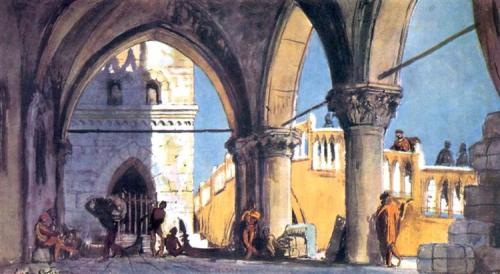“Lament From Epirus” – Christopher King

“Blind Man’s Portion“ (1903)
________
though you’ll have to actively listen
to Christopher King rather than
merely hear him here, as you might
have been doing with many of my
suggested musical pieces, should
you be at all interested in the history
of music, he is fascinating, dates his
investigations back millennia to very
Epirus, Ancient, nearly primordial,
Greece, to mirologia there, ancient
funerary chants
some have survived, and have been
recorded for posterity, one, in 1926,
by a Greek exile fled to New York City,
Alexis Zoumbas, a year later, however
improbably, by an American, a blind
man, his own story inspirational, akin
to that of Epictetus, one of the two
iconic Stoic philosophers, the other,
incidentally, an emperor, though the
blind man here, Willie Johnson, was
never himself a slave, but only, by a
historical whisker, the emancipations
of the American Civil War
Christopher King‘s comparison
of an Epirotic miralogi with an
American one brings up, for me,
the difference between Mozart
and Beethoven, notice how the
Willie Johnson version is more
rhythmic, the cadence is much
more pronounced than in the
Greek one, Johnson would’ve
got that from the musical
traditions Europeans had
brought over from their native
continent, probably also from
Africa, Africans
Beethoven would’ve been
surrounded, meanwhile, by Roma,
perhaps called gypsies then, their
music ever resonant in his culture,
not to mention later Liszt‘s, and
the Johann Strausses’ even, for
that matter, Paganini also seems
to have been imbued with it, it
having come up from Epirus
through, notably, Hungary – not
to mention, later still, that music’s
influence, and I’ll stop there, on
late 19th-Century Brahms
Christopher King, incidentally,
sounds a lot like someone you
already know, I think, from his
eschewing – Gesundheit – cell
phones, for instance, to his
enduring preoccupation with
death, not to mention his
endearing modesty, indeed
his humility, his easy
self-deprecation, despite his,
dare I say, incontestable, and
delightful, erudition
makes one wonder why that
other hasn’t become also
famous yet
what do you think
R ! chard
